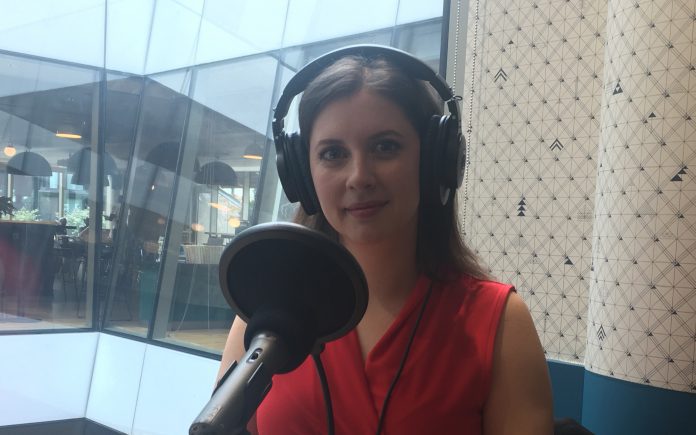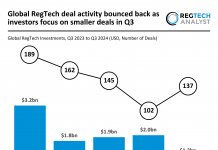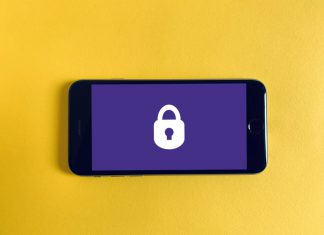Diana Moldovan, UKI cyber operations lead at Aviva, argues that false stereotypes need to be broken about only men being coding geniuses to increase the number of females in cybersecurity.
She made the argument when speaking with FinTech Global as part of a new podcast series called Women Leaders in Finance.
Cybersecurity is becoming one of the most important industries around the world. It is one of the few areas which are important to everyone venturing into the digital realm. As more and more people get connected, companies need to ensure they are protected from all manners of cyber-threats. Phishing scams to access personal data, ransomware to extort people for money are just some of the many methods currently being used by laptop-wielding larcenists.
The sector is attracting a lot of attention in the market as firms put more emphasis on improving their digital defences. In terms of funding, the number of cybersecurity companies receiving funding increased in the last five years. In 2014, of the total investments made in the RegTech sector in 2017, 14.4% were cybersecurity companies, however, last year, this percentage had increased to 19.7%.
A study from Deloitte found that a cyberattack can cost a criminal just $34 a month to conduct, but that it could yield returns of $25,000. If the criminal spends $3,800 on attacks, it can net them $1m a month. There is a never-ending battle to counter these digital threats. There is a global shortage of cybersecurity professionals around the world and, according to Cybersecurity Ventures, there could be a shortage of 3.5 million by 2021. Moreover, the industry is still largely male dominate. So what can be done to encourage more women to take up careers in the space?
Moldovan, UKI cyber operations lead at Aviva, has some thoughts, starting with smashing the idea of male tech geniuses. “There are many stereotypes and most of these are created by us by simply saying, ‘men will always be better at IT,’” she told FinTech Global for her Women Leaders in Finance podcast episode. “’Men will always be better at cybersecurity or you need to be a guru in coding to work in cybersecurity.’ All of these are misconceptions. [It] is not true. There is [a] place for everyone and that’s why we need a diverse industry.”
Moldovan has had almost a decade of experience within the cybersecurity space in a handful of different positions. Currently, she oversees Aviva’s vulnerability management, incident response and threat hunting as well as other operations. Prior to this, she served as a manager in the cyber incident response team in Deloitte.
For Moldovan, cybersecurity did not immediately jump out as the career path for her. When looking back at why she chose to pursue this she stated that, “cybersecurity chose me.”
After leaving university and taking a job in application development she realised coding was not something she wanted to do, but after three months in the job she was given an opportunity to join her employer’s vulnerability management teams and this is where she fell in love with the space.
“There are always new things that are happening, it’s a continuous change and I can never get bored,” she said. “I’m not the type of person who can sit for eight hours in front of a computer and do the same thing.”
Moldovan had been a little desensitised to being the only woman around men. Growing up she spent more time with boys than with other girls and at university only around 15% to 20% of the other students were female.
She added, “When I started to work in [the] IT industry and in cyber specifically, I didn’t necessarily feel that impact of being surrounded only by men. So, there were cases where I worked with 100 men and I was the only girl. But that didn’t impact me in any way to be honest. [I] was privileged in a way. So, I always tried to see the good things [and] not complain. I would love to have more females and I’m involved in programmes to make sure this happens.”
Some of the issues holding back women from positions in the industry are the same ones as those prevalent across most industries. Change is being made, but not enough and not as quickly as it should be. Some of the things which need to change are equal opportunities and pay. One of the aspects Moldovan feels should be offered more widely to women are return to work programmes. These are protocols helping people receive training and support to re-launch their career if they have taken time away from work to raise a family.
She believes women should be encouraged to stay in their role once their maternity leaves are over. This might not seem like a big pain point to some, but she explained that some women who return from maternity leave feel that their role is not the same anymore. Similarly, there needs to be paternity leave should be offered more widely as this helps females and couples alike.
“People need to understand that the diversity is the only way of being successful, of having success, successful projects and teens,” Moldovan said. “It’s been proven that the more diversity needs, the more successful it will be. And also, I would say to women, use your voice. Don’t be afraid to say what’s on your mind.”
While there might be these problems in the marketplace, this shouldn’t stop anyone from persevering in the industry. She believes that “the only barriers are those in our mind.” Moldovan explained, “From my point of view, as long as I’m healthy, [the] sky’s the limit. So, I hope it will be the same for all the women who listen to us. Nothing is difficult when you have the will and the passion, and you work hard for something.”
Moldovan has seen improvements for inclusion and diversity in the workplace over the past year. One great opportunity she sees are secondments, a temporary transfer of an employee to another position. Through this, if someone working in a different department sees cybersecurity as something they would like to explore as a potential career , they can trial the role for a couple of weeks to see if it is what they want and still have the safety of returning to their old role after the trial. “Maybe you will like it, maybe not, but at least you’re not going to question yourself. What if? so take all your opportunities and again, use your voice.”
There are a number of initiatives which have been established to support and empowering females in the workplace and improve diversity in teams. Moldovan is a board member for SHe CISO Exec, a global training and mentoring platform in information and leadership. The programme, which is made up of volunteers, has an aim of bridging the skill gap and confidence gap and empowering future cybersecurity leaders.
Moldovan is a speaker at FinTech Global’s Financial Services CyberTech Forum on September 24. This interview was part of FinTech Global’s new weekly podcast series called Women Leaders in Finance. To listen to the full episode and other insightful interviews, just click on the link.
Copyright © 2018 RegTech Analyst






